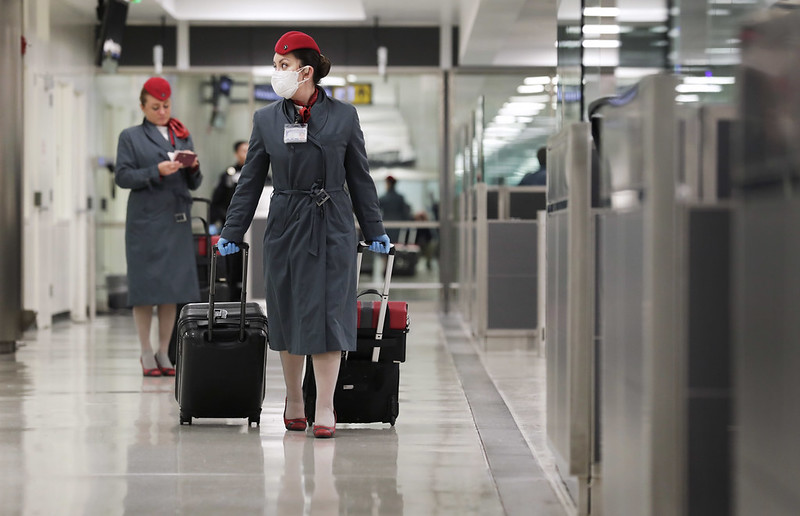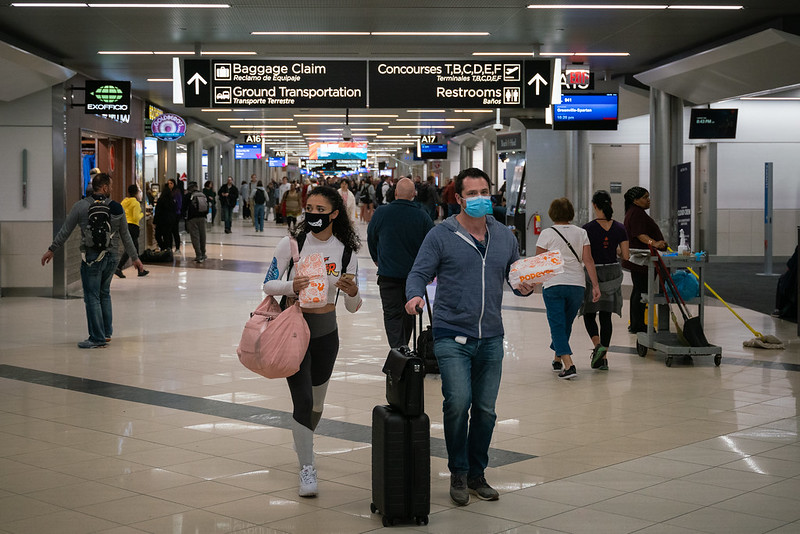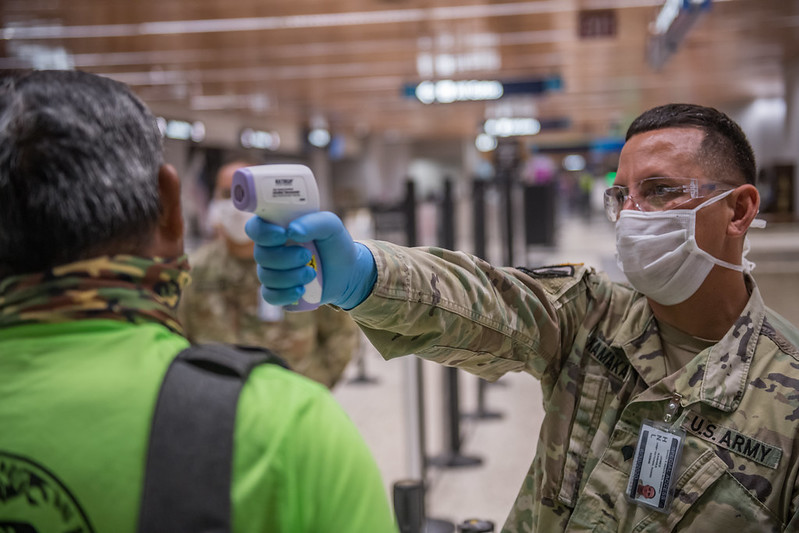SHARES

“I have an upcoming flight to attend an important business meeting. However, I feel anxious. Its all over the news that people may get COVID-19 from air travel. But, if the government and airline company allow for air travel, they must have thought it to be safe enough, right?” Richard worries about his risk of getting COVID-19 during air travel.
As countries start to re-open air travel cautiously, many countries have restrictions against air travel during the COVID-19 pandemic. Before planning any travel, first check the travel restrictions of the destination. Please refer to IATA Travel Centre website for the latest updates on travel restrictions related to the Coronavirus outbreak.
If air travel is possible, make your plans understanding what to expect and how to prepare for safe passage to your destination. There are simple steps you can take to reduce risks of infection during air travel.
Risk Of Getting COVID-19 During Air Travel
In fact, getting an infection on an aircraft is typically lower than say going to in a shopping centre, eating in a restaurant or being in an office. However, air travel can increase your risk for getting COVID-19. This is because you will be required to spend quite some time in the airport for security check, baggage check-in, boarding etc. This puts you at higher chance to get into close contact (<6 feet distance) with other travelers and people at the airport. Staying in close contact during a queue or in crowded place can spread COVID-19 through air droplets produced when people are coughing, sneezing and talking.
Also, we will inevitably get into contact with highly touched surfaces such as washroom faucets, tabletop, doorknobs, chairs, handles, trolleys, etc that may be contaminated by people with COVID-19. If we happen to touch our nose, mouth and eyes with our own contaminated hands, we can infect ourselves with the virus.
Similarly, in a crowded flight, we may need to sit together with other people within 6 feet distance for an extended period of time. We risk inhaling cough and sneeze droplets produced by people sitting nearby. Having said so, most viruses and germs do not spread that readily on flights. The reason is because air circulating in an aircraft passes through a filter, removing 99.99% of dust and germs. Almost all airplanes nowadays have HEPA filters. This is similar to the one used in hospital operation theatre rooms.
How Do I Protect Myself From COVID-19 During Air Travel?
Before Flight
1. Use web check-in for your upcoming flight. In this way, you avoid counter check-in or check-in through self-service machines/kiosks putting you at risk of being in a queue of people and potential contamination when touching counter tops, keyboard buttons, handles etc.
Likewise, pre-order your duty-free shopping online. Your airline may suspend in-flight shopping as well as remove any magazines on board. By ordering online, you get your purchases delivered with packaging properly handled by flight personnel.
2. Make sure you are well for travel without any COVID-19 symptoms such as cough, fever, runny nose and difficulty breathing. If you have been exposed to a COVID-19 patient, contact your family doctor, even though you have no symptoms. You will need lab tests to confirm whether you’re fit for travel. Depending on the rules, you may need to self-quarantine from time of exposure, for 2 weeks before travel.
3. Maintain social distancing in public places. For example, make sure you are at least 6 feet apart from others in the queue during security check and baggage check-in. Also, airport lounges may be closed for the above reason.
4. Airports will conduct temperature screening. Certain airports / airlines may require passengers to undergo a COVID-19 test on-site
5. Always put on a face mask in a public setting. Make sure your mask is on before, during and after the flight. This protect yourself and others from respiratory droplets containing the virus.
6. Bring along your own hand sanitiser. It should contain at least 60% alcohol concentration to effectively kill the virus. Wash your hands often especially after touching highly touched surfaces. Remember, never touch your nose, mouth and eyes without washing your hands!
During Flight
1. Keep your face mask on throughout the flight. Your flight attendants will be wearing protective equipment such as face mask, gloves, (goggles and apron) when serving you to minimize risk of viral spread.
2. Make sure to wash your hands before and after meals. Again, never touch your nose, mouth and eyes with unwashed hands. Furthermore, keep yourself well hydrated and do not rub your eyes. There may be changes to in-flight meals to avoid the use of meal trays. For instance, snack bags, sandwiches and lighter meals.
3. If you are feeling unwell or sick, call for help. The flight attendants are well trained to handle any medical situation in flight. This includes identification and isolation of anyone onboard who are not feeling well to protect yourself and others.
4. Check if your airline provides contactless devices onboard. For example, mobile app to remote control your in-flight movies and entertainment, call for help, etc.
Upon Arrival
1. Usually, upon arrival you are required to fill in a health declaration form. This provides a means to reach you in the event that someone on the flight falls sick due to COVID-19.
2. Your body temperature will be checked again in the arrival hall
3. Certain destinations will require you to undergo a COVID-19 test.
4. If you are a transit passenger, make sure to maintain social distancing, keep face mask on, wash hands often and never touch your nose, mouth and eyes.
5. When you reach your local point at destination, wash your hands, get a bath first and have a change of clothes . Then, you may enjoy your time with your associates or loved ones without any worries of spreading the virus to them.
6. In certain countries, the local governance requires mandatory quarantine of 14 days.
Conclusion
Air travel during COVID-19 is not without risk of getting infected. However, it is relatively safe with proper self-protective measures. By taking simple preventive steps and following government and airline guidelines, we can minimise the risk of viral spread during air travel.
Find a GP/Family Doctor in Malaysia, on GetDoc
Find a GP/Family Doctor in Singapore, on GetDoc
References:
1. National Center for Immunization and Respiratory Diseases. Coronavirus disease 2019 (COVID-19) – travel: frequently asked questions and answers [CDC]. U.S. Department of Health & Human Services. 2020. (Available from: https://www.cdc.gov/coronavirus/2019-ncov/travelers/faqs.html; last updated on 2020 May 28; last accessed on 2020 June 20)
2. Tien LL. COVID-19: flying safe with AirAsia – safety measures AirAsia implements on-ground and in-flight [Internet]. AirAsia Berhad. 2020. (Available from: https://newsroom.airasia.com/news/2020/4/27/covid-19-flying-safe-with-airasia-safety-measures-airasia-implements-on-ground-and-in-flight; last updated on 2020 April 27; last accesedd on 2020 June 20)
3. Precautionary measures to safeguard your well-being [Internet]. Singapore Airlines. 2020. (Available from: https://www.singaporeair.com/en_UK/us/travel-info/covid19-measures/; last accessed o 2020 June 20)
by Chang Xian
View all articles by Chang Xian.







